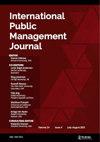治理能力和合法性的动态:新冠肺炎大流行期间的数字追踪技术案例
IF 2.3
3区 管理学
Q2 PUBLIC ADMINISTRATION
引用次数: 3
摘要
摘要政府措施的投入、产出和产出合法性被认为对危机中的治理能力至关重要。在新冠肺炎危机期间,世界各国政府开发了数字联系人追踪应用程序,以支持其危机管理,并取得了不同程度的成功。虽然挪威在危机中表现出色,但在挪威开发的名为Smittestopp的联系人追踪应用程序几乎没有影响。通过案例研究,我们研究了这项技术的治理能力和合法性,包括它是如何发展的,公民对它的利用程度,以及它相对于其他政府措施的有用性。尽管该应用程序对挪威新冠肺炎危机管理的帮助很小,但我们确定了一些需要吸取的重要教训。我们认为,如果一项政府政策要在一段时间内保持产出的合法性,并在危机中有效,那么初始投入和吞吐量的合法性就很重要。因此,本研究有助于研究危机管理中的治理能力和合法性。本文章由计算机程序翻译,如有差异,请以英文原文为准。
The dynamics of governance capacity and legitimacy: the case of a digital tracing technology during the COVID-19 pandemic
Abstract Input, throughput, and output legitimacy of government measures are considered to be essential for governance capacity in crisis. During the COVID-19 crisis, governments around the world developed digital contact-tracing applications to support their crisis management—with varying degrees of success. While Norway is seen as a high performer in the crisis, the contact-tracing app called Smittestopp developed in Norway had little impact. Using a case study, we studied the governance capacity and legitimacy of this technology in terms of how it was developed, how much it was utilized by citizens, and its usefulness relative to other government measures. Although the app did very little to help the COVID-19 crisis management in Norway, we identify some important lessons to be learned. We argue that the initial input and throughput legitimacy is important if a government policy is to maintain output legitimacy over time and be effective in a crisis. Consequently, this study contributes to the literature on governance capacity and legitimacy in crisis management.
求助全文
通过发布文献求助,成功后即可免费获取论文全文。
去求助
来源期刊

International Public Management Journal
PUBLIC ADMINISTRATION-
CiteScore
5.30
自引率
11.50%
发文量
49
期刊介绍:
The International Public Management Journal (IPMJ) publishes high-quality empirical and theoretical work on managing large organizations, particularly public organizations. IPMJ features work from scholars around the world who conduct research in the areas of public management and government reform, comparative public administration, organizational theory, and organizational behavior. IPMJ seeks to provide a bridge between those conducting research on public management and public administration on the one hand, and those working in the areas of organizational behavior and organization theory on the other. IPMJ intends to stimulate and reflect the academic interests of an international constituency of readers and scholars.
 求助内容:
求助内容: 应助结果提醒方式:
应助结果提醒方式:


